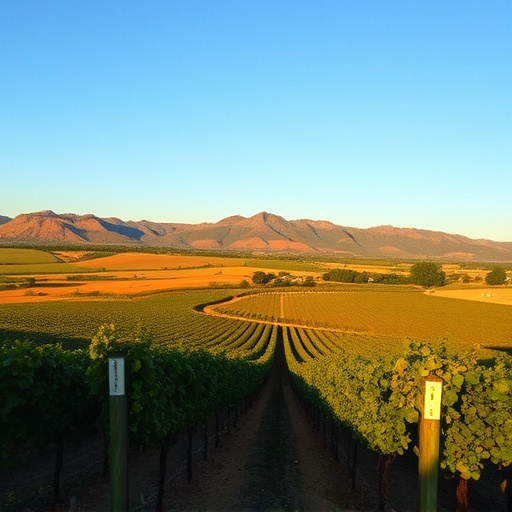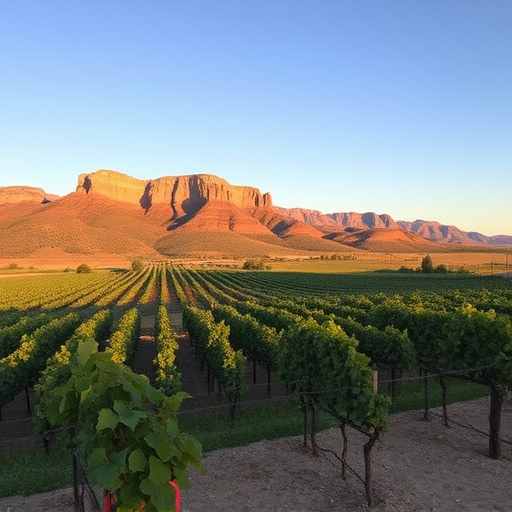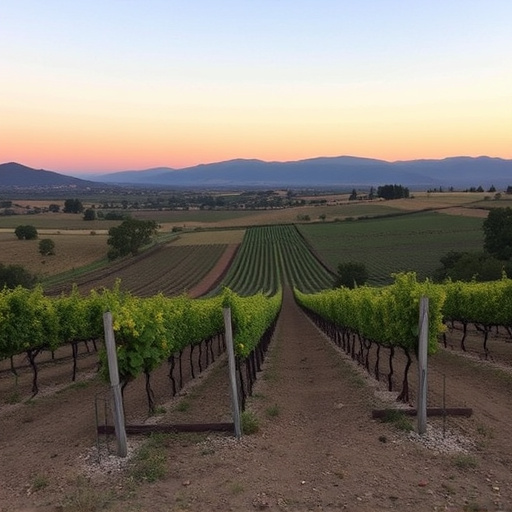Sonoita, Arizona's high elevation winemaking offers unique challenges and benefits, resulting in distinctively flavored wines. With a history dating back to the late 19th century, the region's cool climate, diverse soils, long days, and high elevation protect grapes from pests and diseases, enhancing flavor and acidity. Today, Sonoita AZ wine is renowned nationally for its vibrant flavors, crisp acidity, and signature varietals like Tempranillo, Grenache, and Mourvèdre, attracting both enthusiasts and producers.
“Discover the enchanting world of high-elevation winemaking in Sonoita, Arizona, where the art of viticulture meets the majestic landscapes. This unique region presents a captivating blend of challenges and rewards for winemakers. From navigating extreme temperatures to harnessing the distinct flavors of its altitude, local producers have mastered techniques that result in remarkable wines. Explore the rich history of wine production in Sonoita, uncover the secrets behind its successful high-altitude practices, and delve into the one-of-a-kind varietals that make this Arizona town a true gem for vino enthusiasts.”
- The Unique Challenges and Benefits of High Elevation Winemaking in Sonoita, Arizona
- A Historical Perspective: How Did Wine Production Start in This Region?
- Techniques Used by Local Winemakers to Thrive at Higher Altitudes
- Exploring the Distinct Flavors and Varietals that Result from Sonoita's High-Elevation Climate
The Unique Challenges and Benefits of High Elevation Winemaking in Sonoita, Arizona

High elevation winemaking in Sonoita, Arizona presents both unique challenges and remarkable benefits. The region’s elevated altitude, typically between 4,500 to 6,000 feet above sea level, influences grape growing and wine production significantly. One of the key challenges is the colder climate, which can delay ripening and require specific vineyard management techniques, such as canopy pruning and late-season protective measures. However, this cold climate also contributes to intense flavors and higher acid levels in the grapes, leading to distinctive and complex wines.
The benefits are equally notable. Soils in Sonoita AZ wine regions are often diverse and well-draining, providing an ideal environment for a variety of grape varieties. The long, sunny days and cool nights foster balanced sugar and acid levels in the grapes, resulting in well-structured wines with vibrant aromas and flavors. Moreover, the high elevation offers protection from common wine-making pests and diseases, ensuring that the grapes maintain their integrity throughout the winemaking process. This contributes to the unique character of Sonoita az wine, making it a sought-after destination for wine enthusiasts and producers alike.
A Historical Perspective: How Did Wine Production Start in This Region?

The history of winemaking in Sonoita, Arizona, is a fascinating tale that dates back several decades. The region’s unique high elevation and arid climate, at around 4,000 feet above sea level, presented both challenges and advantages for viticulture. Early settlers in the late 19th century introduced grapevines to the area, primarily for personal consumption and local trade. Over time, as the reputation of Sonoita’s wines grew, small-scale commercial production began to emerge.
The true game-changer was the 1970s when a group of visionary winemakers recognized the potential of this region. They were drawn to the distinctive terroir and began establishing wineries, introducing new grape varieties, and refining winemaking techniques specific to Sonoita’s high elevation. This period marked the formal start of the thriving wine industry that the town boasts today, with its now-famous sonoita az wine gaining recognition not just locally but across the nation.
Techniques Used by Local Winemakers to Thrive at Higher Altitudes

Winemaking in high elevations presents unique challenges, but local vintners in Sonoita, Arizona, have mastered techniques to thrive at these altitudes. One key adaptation is the use of cooler fermentation temperatures, which help preserve the delicate aromas and flavors of the grapes. By carefully controlling climate within their wineries, makers can slow down the fermentation process, allowing for a more nuanced and complex wine profile.
Additionally, winemakers in Sonoita AZ wine focus on specific grape varieties well-suited to higher elevations. They often choose thinner-skinned grapes like Grenache, Mourvèdre, and Syrah, which are less prone to developing bitter tannins common at lower altitudes. These choices, combined with unique terroir, contribute to the distinct character of Sonoita wines, celebrated for their vibrant flavors and crisp acidity.
Exploring the Distinct Flavors and Varietals that Result from Sonoita's High-Elevation Climate

Sonoita Arizona, nestled in the vibrant Sonoran Desert, offers a unique and captivating experience for wine enthusiasts seeking something extraordinary. The high-elevation climate plays a pivotal role in shaping the distinctive flavors and varietals of wines produced in this enchanting region. With elevations reaching over 4,000 feet, the cool nights and warm days create an ideal environment for cultivating a diverse range of grapevines. This extreme altitude provides a natural balance that allows grapes to ripen slowly, concentrating their sugars and developing complex aromatics.
As a result, Sonoita AZ wine stands out for its remarkable character. The region’s signature varietals, such as Tempranillo, Grenache, and Mourvèdre, thrive in this climate, producing wines with vibrant fruit flavors, earthy notes, and robust tannins. These high-elevation wines often showcase unique flavor profiles, featuring hints of cherry, spice, and desert floral notes. The cool nights also help preserve acidity, contributing to the overall balance and longevity of these exquisite beverages.
Sonoita, Arizona, has carved a niche for itself in the world of wine through its high elevation winemaking. By embracing the unique challenges and reaping the benefits of its elevated terrain, local winemakers have cultivated distinctive flavors and varietals that set Sonoita AZ wine apart. The historical roots of this practice and the innovative techniques employed by these artisans contribute to a vibrant and ever-evolving wine culture in this captivating region.
